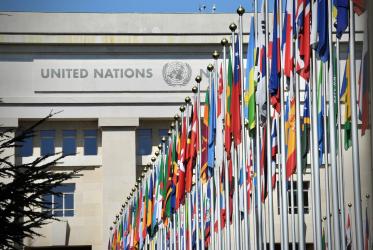In face of what he called "escalating human rights violations," the World Council of Churches (WCC) general secretary Rev. Dr Samuel Kobia announced stronger ecumenical advocacy efforts to bring the Philippines under international scrutiny.
Speaking at a press conference in Manila on Wednesday 21, at the culmination of a four-day visit to the country, the WCC general secretary reaffirmed the Council's "unequivocal condemnation" of extra-judicial killings, including those of church workers and pastors, and its "grave concern" about the increasing militarization of the Philippines.
Kobia announced that the WCC will bring victims of human rights abuses in the Philippines to the upcoming session of the Geneva-based UN Human Rights Council, of which the country is a member. On that opportunity, the Philippines will undergo a new comprehensive review mechanism designed to prevent regimes disrespectful of human rights standards from holding a seat on the very same body charged with policing them at the global level.
Kobia called for the Philippines government to "take necessary action to stop the enforced disappearances" and "put an end to extrajudicial killings". He also requested "an immediate and impartial investigation of all recent extrajudicial executions". This should be done by an "independent inquiry commission" rather than one "made up of the government appointees".
"We condemn the ongoing practice of the Philippine government and the military of labelling and persecuting the churches, pastors and church workers who work for justice, peace and protection of human rights as subversives or communists," said Kobia.
The "killings of several church workers and pastors in recent months," including the "brutal stabbing" of Philippines Independent Church Bishop Alberto Ramento in October last year, Kobia told journalists, were among the main concerns shared with him and a small ecumenical delegation by Filipino church leaders.
"It seemed that the Philippine government is resorting to terrorist means in conducting its 'war on terror'," Kobia said. In particular, the recently enacted Human Security Act is a source of "fear and anxiety" since "many of its provisions are not in accordance with international human rights standards" and could therefore have "a negative impact" on society. The Act's broad definition of "terrorism" gives room for arbitrary actions by the state, he suggested.
"Our call is not to use the militarist approach in solving the problems," Kobia said at the press conference, "but to ensure the resumption of the stalled peace talks" between the government and the National Democratic Front. Addressing the "root causes of the problems in the country, especially the long awaited land reforms and poverty alleviation," would contribute more "to solve the insurgency" than just "military strategy".
Kobia was accompanied by Sophia Adinyira, a justice of the Supreme Court of Ghana and a member of the (Anglican) Church of the Province of West Africa; Rev. Dr Sandy Yule, the national secretary for Christian Unity of the Uniting Church in Australia; and WCC programme executive for Asia Dr Mathews George Chunakara.
Full text of Kobia's remarks at the press conference on 21 November 2007
Media contact in the Philippines: Sharon Joy Duremdes +63-92-0955-6351
Additional information about the WCC general secretary's visit to the Philippines
Feature: Filipino Christians testify on the mistreatment of brothers, sons and husbands
WCC condolence letter for Bishop Ramento to the churches in the Philippines
See also the website of the National Council of Churches in the Philippines







